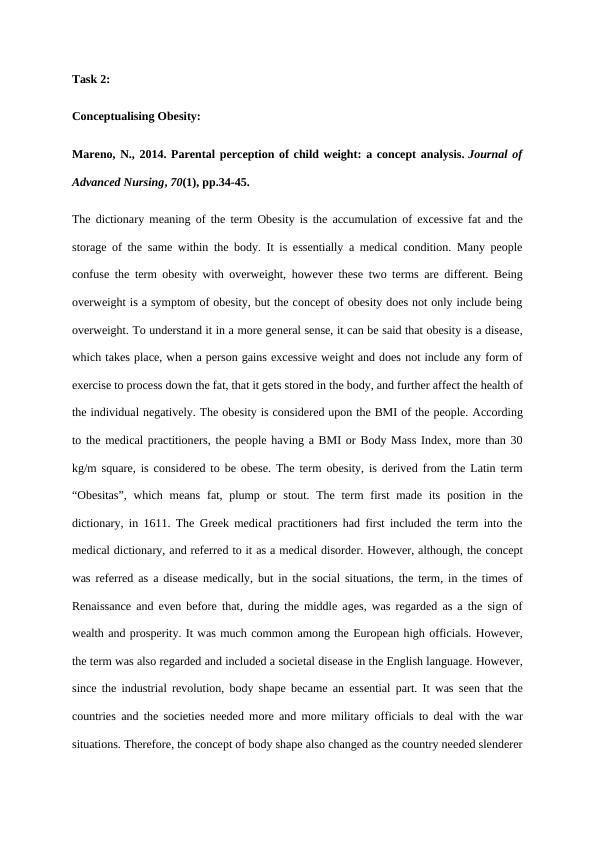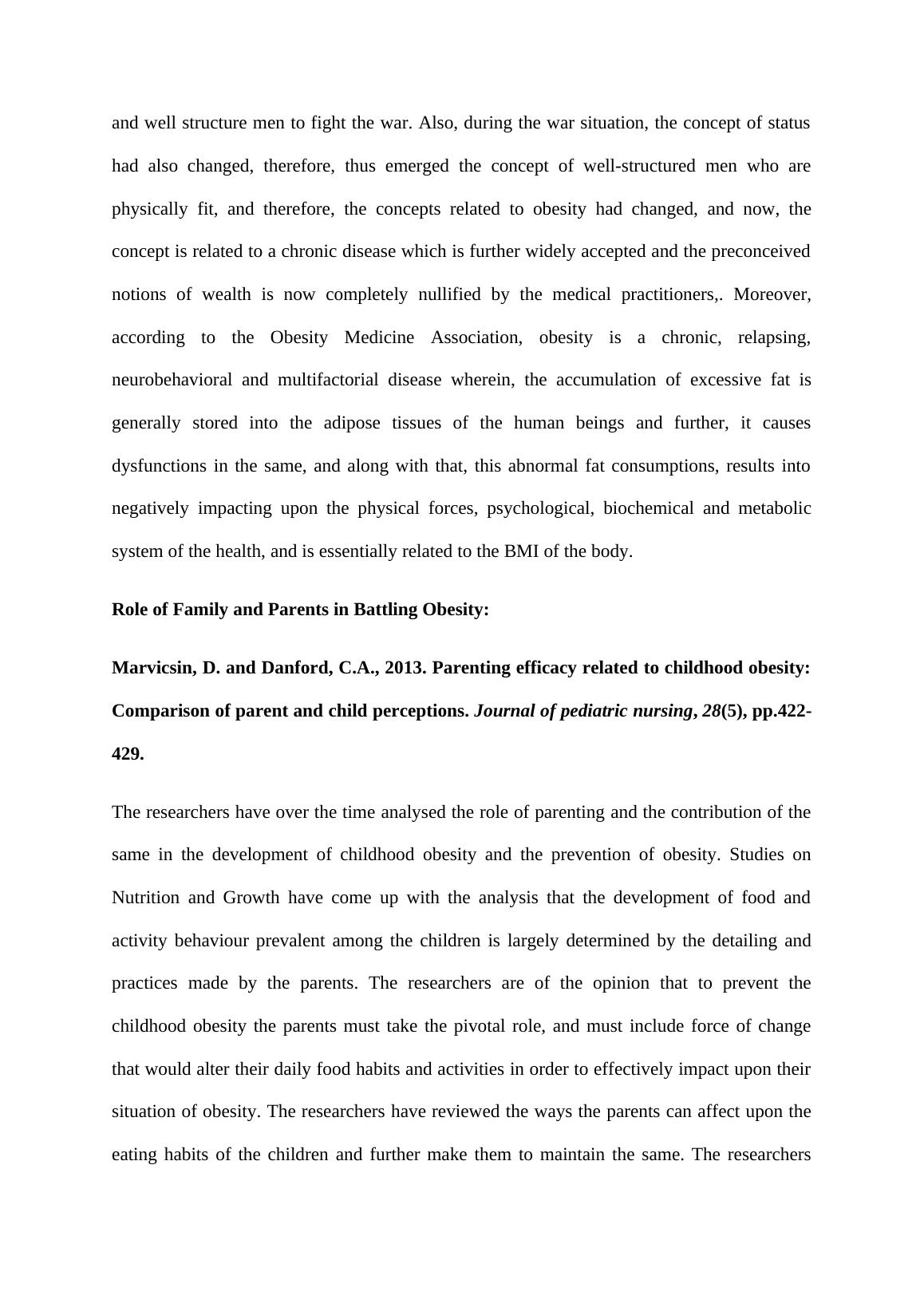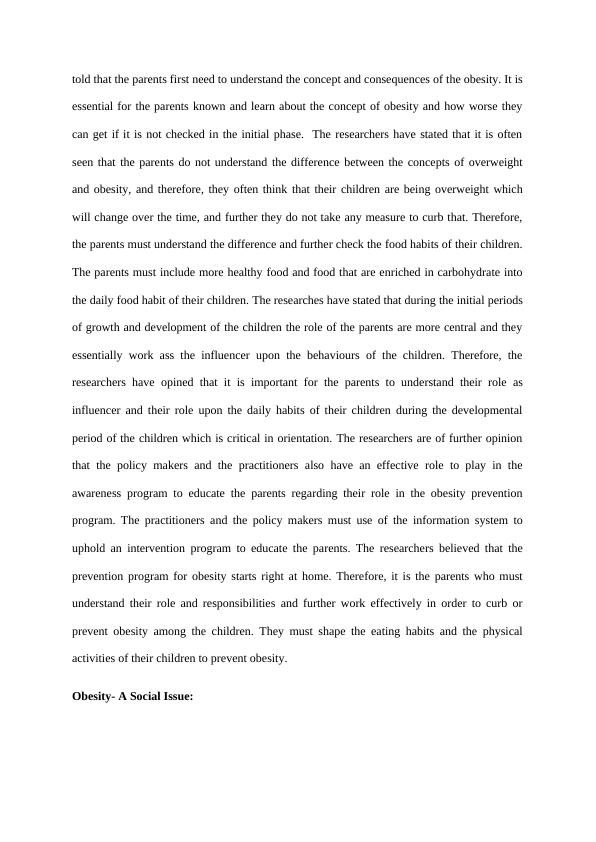Conceptualising Obesity
Added on 2023-03-31
7 Pages1962 Words302 Views
Task 2:
Conceptualising Obesity:
Mareno, N., 2014. Parental perception of child weight: a concept analysis. Journal of
Advanced Nursing, 70(1), pp.34-45.
The dictionary meaning of the term Obesity is the accumulation of excessive fat and the
storage of the same within the body. It is essentially a medical condition. Many people
confuse the term obesity with overweight, however these two terms are different. Being
overweight is a symptom of obesity, but the concept of obesity does not only include being
overweight. To understand it in a more general sense, it can be said that obesity is a disease,
which takes place, when a person gains excessive weight and does not include any form of
exercise to process down the fat, that it gets stored in the body, and further affect the health of
the individual negatively. The obesity is considered upon the BMI of the people. According
to the medical practitioners, the people having a BMI or Body Mass Index, more than 30
kg/m square, is considered to be obese. The term obesity, is derived from the Latin term
“Obesitas”, which means fat, plump or stout. The term first made its position in the
dictionary, in 1611. The Greek medical practitioners had first included the term into the
medical dictionary, and referred to it as a medical disorder. However, although, the concept
was referred as a disease medically, but in the social situations, the term, in the times of
Renaissance and even before that, during the middle ages, was regarded as a the sign of
wealth and prosperity. It was much common among the European high officials. However,
the term was also regarded and included a societal disease in the English language. However,
since the industrial revolution, body shape became an essential part. It was seen that the
countries and the societies needed more and more military officials to deal with the war
situations. Therefore, the concept of body shape also changed as the country needed slenderer
Conceptualising Obesity:
Mareno, N., 2014. Parental perception of child weight: a concept analysis. Journal of
Advanced Nursing, 70(1), pp.34-45.
The dictionary meaning of the term Obesity is the accumulation of excessive fat and the
storage of the same within the body. It is essentially a medical condition. Many people
confuse the term obesity with overweight, however these two terms are different. Being
overweight is a symptom of obesity, but the concept of obesity does not only include being
overweight. To understand it in a more general sense, it can be said that obesity is a disease,
which takes place, when a person gains excessive weight and does not include any form of
exercise to process down the fat, that it gets stored in the body, and further affect the health of
the individual negatively. The obesity is considered upon the BMI of the people. According
to the medical practitioners, the people having a BMI or Body Mass Index, more than 30
kg/m square, is considered to be obese. The term obesity, is derived from the Latin term
“Obesitas”, which means fat, plump or stout. The term first made its position in the
dictionary, in 1611. The Greek medical practitioners had first included the term into the
medical dictionary, and referred to it as a medical disorder. However, although, the concept
was referred as a disease medically, but in the social situations, the term, in the times of
Renaissance and even before that, during the middle ages, was regarded as a the sign of
wealth and prosperity. It was much common among the European high officials. However,
the term was also regarded and included a societal disease in the English language. However,
since the industrial revolution, body shape became an essential part. It was seen that the
countries and the societies needed more and more military officials to deal with the war
situations. Therefore, the concept of body shape also changed as the country needed slenderer

and well structure men to fight the war. Also, during the war situation, the concept of status
had also changed, therefore, thus emerged the concept of well-structured men who are
physically fit, and therefore, the concepts related to obesity had changed, and now, the
concept is related to a chronic disease which is further widely accepted and the preconceived
notions of wealth is now completely nullified by the medical practitioners,. Moreover,
according to the Obesity Medicine Association, obesity is a chronic, relapsing,
neurobehavioral and multifactorial disease wherein, the accumulation of excessive fat is
generally stored into the adipose tissues of the human beings and further, it causes
dysfunctions in the same, and along with that, this abnormal fat consumptions, results into
negatively impacting upon the physical forces, psychological, biochemical and metabolic
system of the health, and is essentially related to the BMI of the body.
Role of Family and Parents in Battling Obesity:
Marvicsin, D. and Danford, C.A., 2013. Parenting efficacy related to childhood obesity:
Comparison of parent and child perceptions. Journal of pediatric nursing, 28(5), pp.422-
429.
The researchers have over the time analysed the role of parenting and the contribution of the
same in the development of childhood obesity and the prevention of obesity. Studies on
Nutrition and Growth have come up with the analysis that the development of food and
activity behaviour prevalent among the children is largely determined by the detailing and
practices made by the parents. The researchers are of the opinion that to prevent the
childhood obesity the parents must take the pivotal role, and must include force of change
that would alter their daily food habits and activities in order to effectively impact upon their
situation of obesity. The researchers have reviewed the ways the parents can affect upon the
eating habits of the children and further make them to maintain the same. The researchers
had also changed, therefore, thus emerged the concept of well-structured men who are
physically fit, and therefore, the concepts related to obesity had changed, and now, the
concept is related to a chronic disease which is further widely accepted and the preconceived
notions of wealth is now completely nullified by the medical practitioners,. Moreover,
according to the Obesity Medicine Association, obesity is a chronic, relapsing,
neurobehavioral and multifactorial disease wherein, the accumulation of excessive fat is
generally stored into the adipose tissues of the human beings and further, it causes
dysfunctions in the same, and along with that, this abnormal fat consumptions, results into
negatively impacting upon the physical forces, psychological, biochemical and metabolic
system of the health, and is essentially related to the BMI of the body.
Role of Family and Parents in Battling Obesity:
Marvicsin, D. and Danford, C.A., 2013. Parenting efficacy related to childhood obesity:
Comparison of parent and child perceptions. Journal of pediatric nursing, 28(5), pp.422-
429.
The researchers have over the time analysed the role of parenting and the contribution of the
same in the development of childhood obesity and the prevention of obesity. Studies on
Nutrition and Growth have come up with the analysis that the development of food and
activity behaviour prevalent among the children is largely determined by the detailing and
practices made by the parents. The researchers are of the opinion that to prevent the
childhood obesity the parents must take the pivotal role, and must include force of change
that would alter their daily food habits and activities in order to effectively impact upon their
situation of obesity. The researchers have reviewed the ways the parents can affect upon the
eating habits of the children and further make them to maintain the same. The researchers

told that the parents first need to understand the concept and consequences of the obesity. It is
essential for the parents known and learn about the concept of obesity and how worse they
can get if it is not checked in the initial phase. The researchers have stated that it is often
seen that the parents do not understand the difference between the concepts of overweight
and obesity, and therefore, they often think that their children are being overweight which
will change over the time, and further they do not take any measure to curb that. Therefore,
the parents must understand the difference and further check the food habits of their children.
The parents must include more healthy food and food that are enriched in carbohydrate into
the daily food habit of their children. The researches have stated that during the initial periods
of growth and development of the children the role of the parents are more central and they
essentially work ass the influencer upon the behaviours of the children. Therefore, the
researchers have opined that it is important for the parents to understand their role as
influencer and their role upon the daily habits of their children during the developmental
period of the children which is critical in orientation. The researchers are of further opinion
that the policy makers and the practitioners also have an effective role to play in the
awareness program to educate the parents regarding their role in the obesity prevention
program. The practitioners and the policy makers must use of the information system to
uphold an intervention program to educate the parents. The researchers believed that the
prevention program for obesity starts right at home. Therefore, it is the parents who must
understand their role and responsibilities and further work effectively in order to curb or
prevent obesity among the children. They must shape the eating habits and the physical
activities of their children to prevent obesity.
Obesity- A Social Issue:
essential for the parents known and learn about the concept of obesity and how worse they
can get if it is not checked in the initial phase. The researchers have stated that it is often
seen that the parents do not understand the difference between the concepts of overweight
and obesity, and therefore, they often think that their children are being overweight which
will change over the time, and further they do not take any measure to curb that. Therefore,
the parents must understand the difference and further check the food habits of their children.
The parents must include more healthy food and food that are enriched in carbohydrate into
the daily food habit of their children. The researches have stated that during the initial periods
of growth and development of the children the role of the parents are more central and they
essentially work ass the influencer upon the behaviours of the children. Therefore, the
researchers have opined that it is important for the parents to understand their role as
influencer and their role upon the daily habits of their children during the developmental
period of the children which is critical in orientation. The researchers are of further opinion
that the policy makers and the practitioners also have an effective role to play in the
awareness program to educate the parents regarding their role in the obesity prevention
program. The practitioners and the policy makers must use of the information system to
uphold an intervention program to educate the parents. The researchers believed that the
prevention program for obesity starts right at home. Therefore, it is the parents who must
understand their role and responsibilities and further work effectively in order to curb or
prevent obesity among the children. They must shape the eating habits and the physical
activities of their children to prevent obesity.
Obesity- A Social Issue:

End of preview
Want to access all the pages? Upload your documents or become a member.
Related Documents
Public Health - Obesity | Assignmentlg...
|13
|4052
|49
Teritiary Managementlg...
|8
|2135
|17
The Impact of Obesity on Adult Well-beinglg...
|38
|7011
|204
Impact of Obesity in Australia on Morbidity and Mortality in Adultslg...
|7
|2200
|50
System Map on Obesity: Risk Factors, Current Scenario, and Interventionslg...
|6
|1073
|140
Obesity: Determinants and Prevention Approacheslg...
|13
|3511
|469
